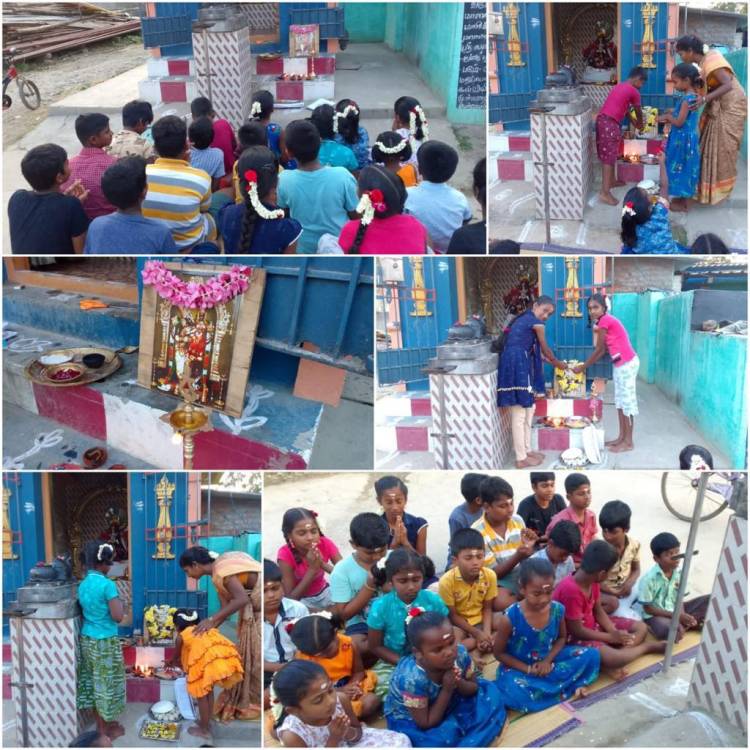[GHHF] Bala Samskar Kendras in Tamil Nadu – Students performed Hayagriva Puja, learned about Stotram and its benefits ahead of Annual Examinations.
 Sa`Id Al-Andalusi (1029 -1070) Islamic scholar
Sa`Id Al-Andalusi (1029 -1070) Islamic scholar
"The Indians among all nations, through many centuries and since antiquity, have been the source of wisdom, fairness and moderation. They are creators of sublime thoughts, universal apologues, rare inventions and remarkable concepts."
Global Hindu Heritage Foundation has been consistently working to preserve and protect our Sanatana Dharma for decades. Many people across India have been calling to find out how we are organizing Ghar Waapasi and what it takes to organize in their respective States. Many IT people who are following our efforts have been spreading the news to their friends and slowly reaching to many places. One such incident happened recently. Sridhar is one such friend who is following our efforts reached our office in Visakhapatnam and decided to help organize the Ghar Waapasi and Bala Samskar programs in Tamil Nadu. It is through his help we have started about ten Bala Samskar Kendras in Tamil Nadu.
What is the significance of Hayagriva Stotram?
Bala Samskar teachers performed Hayagriva puja, taught the Bija Mantra of Hayagriva and taught the significance of Hayagriva Puja. In Tamil Nadu, people have a tradition of performing Hayagriva Puja for his blessings to pass the final exams. Chanting Hayagriva Mantra is believed to bestow siddhi power, excellent memory, and power of speech. Chanting of Hayagriva Beej Mantra on Hayagriva Jayanthi grants clarity of thoughts, memory power, excellence in arts, career growth, material abundance, prosperity, and improved intelligence.
Hayagriva is the conqueror of the Vedas. Hayagriva means the horse necked. In the incarnation of Vishnu, Hayagriva depicts the human body with a horse face. The sole goal of the avatar was to recover the stolen Vedas from the Asuras or Demons.
The Story behind the Incarnation of Hayagriva
There are many versions of the conceptualization of Hayagriva. The first one goes like this; Vishnu disclosed the Vedas to creator Brahma. Coming to know of it, two asuras, Madhu and Kaitabha, stole the Vedas and concealed it in the ocean bed. Brahma was worried about losing the most valuable Sacred texts and sought the help of Vishnu. With interest in bringing back the Vedas to their rightful owner, Vishnu took the form of horse-faced Hayagriva, destroyed the Asuras, and brought back the Vedas.
Devi Bhagavat Purana has it that a demon called Hayagriva – a horse-faced human, appeased Goddess Durga and was blessed with the boon of immortality with the condition that only another Hayagriva could kill him. With his newfound boon, Hayagriva started to wreak havoc in the abode of the Devas. Unable to withstand the demon’s torture, the Devas sought refuge in Vishnu. Since the boon was granted by Durga, the supreme Goddess, even Vishnu was helpless.
After a tough battle with the demon, Vishnu was tired and rested in Padmasana. In an effort to wake Vishnu, Brahma thought of an idea. He used termites to gnaw the bowstring to create sound to wake up Vishnu. But unfortunately, the string snapped at his neck, and the body was severed from his head. Unaware of what to do next, Brahma prayed to the Mother Goddess, seeking her help. The Goddess attached a white horse head to the body of Vishnu. Thereby Vishnu took the form of Hayagriva. This day is celebrated as Hayagriva Jayanthi.
Now, Hayagriva is ready to battle the Demon. The demon was consumed in the process. Vishnu regained his original form.
What is Beej Mantra?
The Beej Mantra is called the seed mantra, the shortest form of mantra having supreme power, and its sound brings spiritual upliftment. Each Divine being has a Beej Mantra exclusive to them. Like a seed grows into a strong tree, a Beej Mantra spreads positive energy. It is the soul call. It is chanted during Hayagriva Jayanthi pooja.
Hayagriva Beej Mantra
The most important Hayagriva Mantra is as follows:
Om srim hlaum om namo bhagavate hayagrivaya
vishnave mahyam medham prajnam prayaccha svaha
The mantra pays obeisance to Lord Hayagriva. It is a hymn to seek knowledge and wisdom. In this mantra, Om and Srim are considered to be two syllables, whereas Hlaum is a single syllable. (Source: https://os.me/short-stories)
DONATIONS
PayPal Method: To donate visit our website: savetemples.org. Click on the Donate button, then press the Purpose category, and select the General Donation category.
By Check: Or you can send a check payable to: GHHF, . It is tax-deductible.
By Zelle: ghhfusaorg@gmail.com
By Rupees, please contact us by either phone or email.
For more information, call Prakasarao V Velagapudi ; Email: ghhfusaorg@gmail.com















 Urgent support needed for Bangladesh Hindus
Urgent support needed for Bangladesh Hindus 







